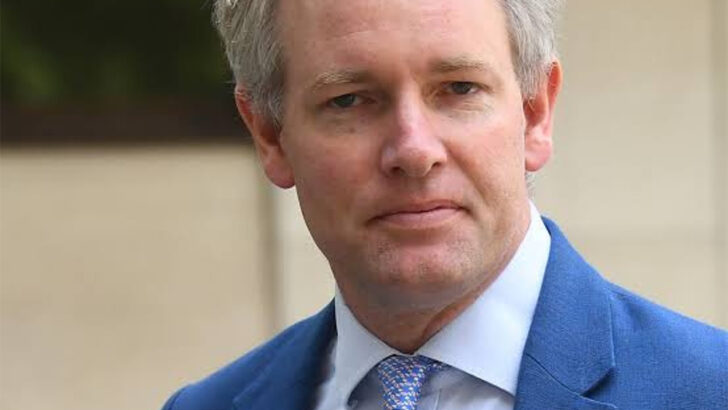The battle between good and evil is a reality in life and a staple source of plots in fiction.
The struggle is particularly prominent on the Lord of the Rings universe. The second season of the spin-off Rings of Power (Amazon Prime, Thursday) came to an end last week. I stuck it out to the end though much of it was talky and turgid, with interweaving plotlines that didn’t integrate very well. They did pick up the pace in the last two episodes, with some dramatic battle scenes, though I thought the violence was unnecessarily gruesome. There were religious resonances, with themes of temptation, greed, pride and corruption particularly prominent towards the end. We were left in no doubt as to the corrosive and destructive nature of such negative traits. One scene was reminiscent of the gruesome martyrdom of St Sebastian (death by many arrows), while another was a rather obvious variation of the crucifixion moment when the side of Jesus was pierced by a lance. There were a few false finishes before they finally let go, with a tying up of loose ends, but leaving enough of those to have options open for a third series.
There was more moral ambiguity, not as clear a delineation between good and evil, in Nightsleeper (BBC One) which I reviewed last week after five episodes. It finished on Monday of last week and the last episode, while it was exciting enough, didn’t serve to make my overall assessment less negative. It was noteworthy however that in the height of the crisis on the hijacked train that people started to pray – a natural reaction in a life-threatening crisis, but one that rarely features in TV drama or in the movies. The prayers were led by the gay porter!
No doubt some (including Irish media commentators) would see the US presidential campaign as a battle between good and evil. The US Vice Presidential Debate (Sky News, Wednesday) was much anticipated, and in the line of duty I watched it all and actually enjoyed it. It was cordial and respectful, with Tim Walz and J.D. Vance debating policy, listening to each other and actually agreeing with each other at times. The ugly polarisation of US politics was muted and the debate was all the better for it. Where there was any harsh criticism, it was mostly the participants attacking the other’s running mate – Walz attacking Trump and Vance attacking Harris. Biden hardly got a mention.
The abortion issue figured large, with Walz reluctant (as Kamala Harris was in the presidential debate) to be clear on what if any restrictions he’d place on abortion. Vance said he wanted to protect innocent human life and concentrated on what supports could be put in place to ensure that women wouldn’t feel they had no choice but to have an abortion.
Another right-to-life issue, ‘assisted dying, became prominent in the UK with a new private member’s bill being launched. On Sky News (Thursday) Danny Kruger MP (Conservative) was concerned about the development, wary of this move towards what he called ‘artificial death’. There was also a disability campaigner who feared the pressure that would come on the disabled. Proponents also featured, but generally the debate on the matter was more thorough and more balanced than we get over here. On Times Radio Breakfast (Friday) there was a sensible and balanced debate, with presenter Chloe Tilly asking lots of challenging questions of a supporter of assisted dying, Lord Falconer. These questions must be asked more consistently over here, before it’s too late.
Finally, on Lunchtime Live (Newstalk, Tuesday) the question of godparents was discussed – did godparents need to be religious? Yes, I thought, duh! But not all callers thought so. Some fellow called Brendan rang in to provide useful information on what the Catholic Church taught – quoting from the Catechism of the Catholic Church and the Code of Canon Law, primary sources I would have thought. He did understand also that issues can arise in families, and people wouldn’t want to offend – though this would be a poor reason to choose a person with no faith for the role. One woman referenced the idea of a ‘guidemother’, implying presumably a complementary ‘guidefather’. This, it seems, is the way people are approaching it in an increasingly secular context. It just shows that the original religious concept makes sense on a human level.
PICK OF THE WEEK
Film: Twelve Angry Men
RTE One Saturday October 12, 4pm
(1957) A dissenting juror (Henry Fonda) in a murder trial slowly manages to convince the others that the case is not as obviously clear as it seemed in court. Justice theme is central.
Sunday
BBC Radio 4 Sunday October 13, 7am
In-depth coverage of topical religious and ethical issues.
I AM WITH YOU- A DOCUMENTARY ON CARLO ACUTIS
EWTN Tuesday October 15, 11.30pm
Filmed on location in Italy, this EWTN original documentary chronicles the life and witness of Blessed Carlo Acutis. It features photos, interviews and recollections with family, friends and others who knew him.


 Brendan O’Regan
Brendan O’Regan Danny Kruger MP
Danny Kruger MP 